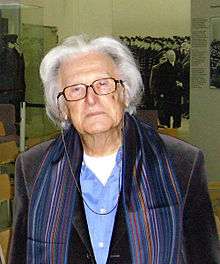Ralph Giordano
Ralph Giordano (23 March 1923 – 10 December 2014) was a German writer and publicist.

Life and career
Giordano was born to a Sicilian father and a German Jewish mother in Hamburg.[1] Because his mother, a piano teacher, was Jewish, the family was persecuted repeatedly after the Nazis seized power in January 1933. Ultimately, they survived the Holocaust by hiding in a friend's cellar.[1]
After his wartime experiences, Giordano temporarily became a communist. In 1955, he settled in the German Democratic Republic, but soon grew disillusioned because of his dislike of Stalinism and returned to Hamburg (in West Germany). Giordano left the German Communist Party in 1957.[1] In 1961, he published The Party is Always Right! about his break with communism and the crimes of Josef Stalin.
In 1958, Giordano reported on West German trials of Nazi war criminals for the Central Council of Jews in Germany (Zentralrat der Juden in Deutschland). In 1964, he joined the Cologne-based West German Broadcasting organization (Westdeutscher Rundfunk — WDR) as a journalist and remained there until 1988.[1]
In 1982, he published his most widely known work, Die Bertinis, a semi-autobiographical novel portraying the experiences of a family of mixed ethnic heritage (including Jewish) from the end of the 19th century through the end of World War II. In 1988, it was presented in a television series aired on the Second German TV network (Zweites Deutsches Fernsehen, or ZDF).
Thereafter Giordano worked as a freelance writer and wrote numerous articles about his experiences in Nazi Germany and about the dangers of Neo-Nazi movements. He saw Islam as a threat: In a New York Times interview in 2007, he vehemently opposed the construction of a new mosque in Cologne, citing German mosques as "a symbol of a parallel society", and called the integration of German Muslims "a failure".[2]
While working on German television programs, Giordano produced the first TV documentary on the Armenian Genocide.[3]
Personal life
Giordano was married three times. His longtime first wife, Helga, died of cancer in 1984. He and his second wife, Tanja, were divorced in 1988 after one year together. Giordano was married to his third wife, Roswitha Everhan, from 1994 until her death from cancer in 2002. He lived in Cologne.[1] Giordano was a close friend of black German-American journalist Hans Massaquoi since their Swingjugend times in wartime Hamburg.
Ralph Giordano died on 10 December 2014, aged 91, in a Cologne hospital of complications following a hip fracture.[4][5]
References
- "Ralph Giordano - Biografie WHO'S WHO". www.whoswho.de.
- Landler, Mark (5 July 2007). "Germans Split Over a Mosque and the Role of Islam" – via NYTimes.com.
- Andreas Maislinger, Coming to Terms with the Past: An International Comparison, in Russell F. Farmen (ed.), Nationalism, Ethnicity, and Identity: Cross National and Comparative Perspectives, London and New York: Routledge, 2016, p. 174.
- Ralph Giordano ist tot. In: Focus, 10 December 2014 (accessed March 30, 2016).
- German Holocaust writer, commentator Ralph Giordano dies Deutsche Welle, 10 December 2014 (accessed March 30, 2016)
External links
- Biography at whoiswho.de (German)